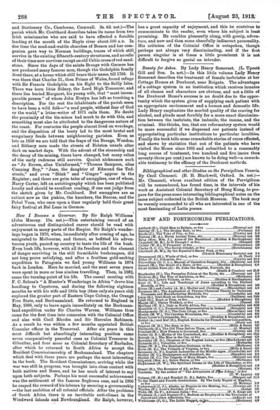How I Became a Governor. By Sir Ralph Williams (John
Murray. 15s. net.)—This entertaining record of an adventurous and distinguished career should be read with enjoyment in many parts of the Empire. Sir Ralph's wander- ings began in 1870, when, immediately after coming of age, he emigrated to Melbourne, and thence, as befitted his adven- turous youth, passed up country to taste the life of the bush. Even bush life, however, with all its freedom and the element of danger surviving in the still formidable bushrangers, did not long prove satisfying, and after a fruitless gold-seeking expedition to Patagonia we find young Williams in 1874 back in London. Here he married, and the next seven years were spent in more or less aimless travelling. Then, in 1882, came the turning-point of his life. The casual meeting with F. C. Selous's "A Hunter's Wanderings in Africa" drove him headlong to Capetown, and during the following eighteen months he with his wife and little boy (then only six years old) explored the greater part of Eastern Cape Colony, the Orange Free State, and Bechuanaland. He returned to England in May, 1886, only to leave again immediately on the Bechuana- land expedition under Sir Charles Warren. Williams thus came for the first time into connexion with the Colonial Office and also with Cecil Rhodes and Sir Hercules Robinson. As a result he was within a few months appointed British Consular officer in the Transvaal. After six years in this most difficult but absorbingly interesting position came seven comparatively peaceful ones as Colonial Treasurer in Gibraltar, and four more as Colonial Secretary of Barbados, after which he returned to South Africa to accept the Resident Commissionership of Bechuanaland. The chapters -which deal with these years are perhaps the most interesting in the book. The Resident Commissioner, arriving while the war was still in progress, was brought into close contact with both natives and Boers, and be has much of interest to say upon both subjects. Perhaps his most successful achievement was the settlement of the famous Segkorna case, and in 1906 he reaped the reward of his labours by securing a governorship —the last ambition of all colonial officials. After the problems of South Africa there is an inevitable anti-climax in the Windward Islands and Newfounaland. Sir Ralph, however, has a great capacity of enjoyment, and this he contrives to communicate to the reader, even where his subject is least promising. He rambles pleasantly along, with gossip, adven- ture, and now and then some cheerfully indiscreet personality. His criticism of the Colonial Office is outspoken, though perhaps not always very discriminating, and if the first person singular is at times a little prominent it is not difficult to forgive so genial an intruder.






































 Previous page
Previous page